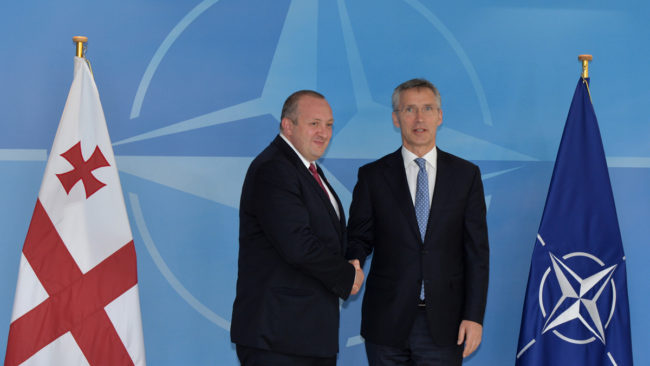On June 8, NATO Secretary General Jens Stoltenberg welcomed Georgian President Giorgi Margvelashvili to NATO Headquarters for talks on Georgia’s ongoing reform efforts and prospect for further cooperation.
Stoltenberg praised Georgia’s contribution to NATO’s Resolute Support Mission (RSM) in Afghanistan and welcomed Georgia’s impressive defence reform. The Secretary went further by stating that “Over the past two years, we have put in place a substantial NATO-Georgia package of support to strengthen Georgia’s defence capabilities and implementation is well on track” continuing on he added “At the Warsaw Summit next month, we will further strengthen our package of support for Georgia.”.
This sentiment was supported this week by former Prime Minister and Georgia’s Bidzina Ivanishvili who told RFE/RL that Georgia “must absolutely” join NATO and the European Union. Ivanishvili, who still holds significant power in Georgian politics went on to say that “We must patiently strengthen our democratic institutions, we must make our economy flourish and wait for the right time, when Russia realizes, and when our allies see that it’s time for Georgia to become a member of NATO and the EU”.
While the consensus is that there is actually very little appetite among NATO members or from European Union members for Georgia’s admission as a member of either institution, the comments will still no doubt infuriate Russia and pro-Russian Georgians. As the 2008 invasion of Georgia by Russia demonstrates, the Kremlin considers Georgia as part of its sphere of influence and in essence ‘one of its children’. Russia’s direct support for separatists in the Ukraine reinforces the strength of feeling in Russia that encroachments into its sphere of influence by Europe will be met with force.
So with a national election coming up in Georgia in October, where does this leave the current government?
Russia, which still occupies 20% of Georgian territory, sees Georgia’s strategy of ‘creeping membership’ of NATO and the EU as a direct threat and is mobilising pro-Russian nationalists and elements of the conservative Georgian Orthodox Church ahead of the upcoming election. The Kremlin has been pouring money into pro-Russian media outlets and political parties in an effort to strengthen their position and influence with voters.
The current Georgian President however is seen by many as actually taking a far more conciliatory approach to Russia than his staunchly pro-western predecessor Mikheil Saakashvili. President Margvelashvili and his government have remained firmly neutral on the Ukraine situation, resisting the urge to provoke Russia. This has meant that many of the Kremlin’s subversive tactics are failing to erode support for Margvelashvili.
While many in Georgia recognise that both NATO and the EU are doing whatever they can to delay Georgian membership, there is a sense that no security relationship will be perfect and therefore closer ties to both institutions is the best hope an aspirational Georgia has for sustainable security and economic development.
